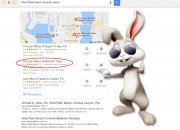
Imagine the family-owned pizzeria down the street investing in search engine optimization. Everyone in town knows they make the best pizza around, but now the family wants to grow its business regionally. Perhaps they’re trying to grow brand awareness before franchising, or maybe they simply want more out-of-town orders, so the family attempts to rank for the keyword phrase “order pizza online.”
Of course, the effort is a flop, resembling a freshly spun ball of dough smacking on the table. Why? National chains such as Papa John’s, Pizza Hut, Domino’s, and Little Caesar’s dominate the keywords “order pizza online.” To compete for front-page attention, the family would have to spend thousands on SEO alone, a pricey investment their small business can’t afford to make.
The reality is that small business owners and marketers like you can relate to this family-owned pizzeria. Chances are you:

- Want the most out of your marketing dollars.
- Desire the biggest SEO results possible.
- Are “willing to invest in whatever it takes” to succeed.
While these are certainly admirable traits, they’re simply the topping of the pizza, if you will. Most business owners fail to recognize the “dough,” or the substantive practices that drive online marketing success.
Too often, small business owners and marketers target broad keywords such as “order pizza online,” when local SEO is a better approach. The family would have been more effective in ranking for “order pizza online in Charlotte,” where it would only have to compete with local brands. Is your local SEO campaign truly optimized for success?
Understanding the Secret Keys to Local SEO Success

According to Jill Whalen, a high rankings advisor, “Even the best SEOs are not magicians. They can’t simply place a site at the top of the engines when there are hundreds of thousands (if not millions) of others that offer basically the same thing, and provide basically the same information. If they could, you’d see a whole lot more millionaire SEOs.”
This is why the real SEO techniques and strategies are kept “secret.” If everyone knew the keys to local SEO success, then everyone would be ranking on the front page, which is impossible. Let’s take a moment to expand on the half-truths circulating out there and define what makes a successful local SEO campaign:
- Go beyond local pages. Other how-to guides and marketers will tell you to create local places pages to boost local SEO, but isn’t this a given? Yes, you should create local pages, but this is merely the bare skeleton of an effective local SEO strategy. Instead, go beyond local pages and consider investing in local content marketing, a strategy that costs 62 percent less than traditional advertising yet generates three times the leads.
Marketers and small businesses should focus on local-oriented topics for content marketing success. For instance, publish business blogs on the latest community events and happenings. Did employees of your business participate in a local community service project? Are you about to offer a special deal? If so, these are great ideas to inspire content that relates to the local community.
Remember, when it comes to content marketing and local SEO, it’s vital to focus on topics that relate directly to your community. This ensures your content is actually valuable and read by your followers while providing you with the keywords necessary for local SEO success.
- Encourage customers to leave reviews. Marketers and small businesses must always encourage customers to leave positive reviews about their experience. Today, user-review sites such as mobile app Yelp play a critical role in boosting local SEO. Each month, Yelp reaches 100.3 million unique visitors in the United States alone, so it’s vital for small businesses to get competitive on this platform. Since Yelp is a location-based app, it’s effective in small communities and major metropolitan areas alike.
One of the most effective ways to garner reviews is to generate a call-to-action (CTA). Most marketers and small businesses mistakenly assume that CTAs are only useful for conversion rates, but they can be used to drive digital engagement as well. CTAs appeal to customers’ unconscious minds, making them more likely to engage with your brand again in the future.
Consider including a CTA in your next email newsletter asking your followers to leave positive feedback on Yelp and similar review sites. Perhaps offer a reward such as a coupon or freebie for those who leave a review. Whatever your prerogative, utilize CTAs to increase your number of positive reviews on Yelp and the sites that matter most.

- Stick to social, even if you think it doesn’t matter. For small businesses, there’s nothing more discouraging than a low number of likes on social media. Unfortunately, there’s a misconception that social marketing success equals a large number of followers. The reality is that when it comes to local SEO, it’s better to have a few targeted followers than many that don’t care about your brand.
Since social media sites rank highly on search engines, a strong social presence indirectly benefits local SEO. Consistently posting on social media also let’s your followers know you’re committed to their satisfaction. Since 7 out of 10 consumers are more likely to conduct business with a brand that’s on social media, it’s vital for local businesses to invest heavily in their social presence.
As a marketer, implementing these three keys will unlock the power of local SEO for your clients. However, it’s equally important to steer clear of the local marketing myths that can derail the most strategic campaigns.
Dangerous Local Marketing Myths to Avoid
It’s not surprising that small business owners and many marketers lack knowledge about local SEO. In today’s age of circulating content, it’s easy to become exposed to misapprehensions and misconceptions about local SEO marketing.
Myth No. 1: Our Business Doesn’t Need Mobile Marketing
Today, over 40 percent of all time spent on the internet is done on mobile devices, and that figure is expected to continue growing. What’s even more eye opening is that 48 percent of mobile searches are related to automotive, home and garden, or apparel and beauty searches. The clear reality is that consumers are relying on their mobile devices more than ever to learn about new businesses and engage their favorite brands.
Unfortunately, small or local businesses often make the mistake of assuming they’re “too small to need mobile marketing.” However, according to Google, any business’s failure to optimize for mobile will hurt their local SEO rankings. The most cursory study of Google’s Penguin, Panda, and Hummingbird updates reveals the search engine’s commitment to mobile users. Whether or not you think your business needs mobile, it does, especially if you desire local SEO success.
Myth No. 2: Local SEO is Only About SEO
False. Local SEO is more than merely search engine optimization: it’s about establishing a meaningful and valuable online presence. Depending on the location of your business or your client’s business, there may be up to 300 competitors in the area, all of which are vying for similar local SEO success. Keyword optimization and content marketing aren’t enough to compete with established competitors.
Instead, local businesses and marketers alike must focus on their entire digital presence. From social media to the business blog, review sites to inbound links, you need to create a comprehensive strategy for your clients. After all, organic rankings aren’t your only way to earn business. Together, these various efforts create multiple streams of traffic that grow business and strengthen local SEO results.
Myth No. 3: We Don’t Need Multimedia

Again, there’s a common misperception that multimedia is a marketing strategy reserved for the “big dogs.” This couldn’t be further from the truth. If a picture says a thousand words, then wouldn’t that help any local SEO efforts? Today, search engines offer a mix of blended search results that include text, image, and videos. Remember, images aren’t solely for the SEO value – they contribute to a positive user experience as well.
Aside from investing in images, consider utilizing YouTube to boost local SEO results. While it’s tempting to think of YouTube as “just” a video-hosting platform, it’s actually the second largest search engine in the world. When uploading to YouTube for local SEO, it’s important to geotag your videos, link to your business in the description, use local keywords in the video tag, push the video on your Google+ local page, embed the video on the company blog, and include your name, address, and phone number.
If there’s more than one video, then it might also be beneficial to optimize the entire channel itself. While this isn’t necessary, it could provide the extra push needed to achieve local SEO success.
Billy’s Bakers: A Case Study in Local SEO Success
Let me ask you a question: how many bakeries do you think are in New York City? Think about the number in your mind.
Got it?
According to the Yellow Pages, there are at least 2,204 bakery listings in New York alone. As you can imagine, ranking on the first page would be a feat for anyone, yet Billy’s Bakery is able to dominate the front page for its selected listings. Virtually every variation of the keyword “bakery New York City” yields Billy’s Bakery in the results. Furthermore, the New York bakery chain dominates search results with its website, Google Maps listings, local listings and reviews, third party reviews, social pages, and media coverage.
Wow. Talk about a comprehensive digital strategy that resulted in local SEO success. By properly optimizing its website, pursuing an authentic link strategy, creating valuable content for its clients, encouraging online reviews, engaging social media, and investing in multimedia, Billy’s Bakery has become the king of dough and SEO!
Go Local or Go Home: Are You Doing What’s Best for Your Clients?
As a marketer, are you encouraging your clients to invest in local SEO? The reality is that most business owners know the general results they want with SEO, but don’t understand the nuanced factors that contribute to online success. It’s your job to encourage your clients to pursue a strategy that yields the highest marketing return-on-investment possible. Happier clients mean more business for you!
Conversely, if you’re a business owner reading this article for DIY tips, then it’s important to realize SEO truly is a complex beast to tackle. While it’s certainly possible to do it yourself, local SEO is time consuming. You might consider hiring an experienced marketer to save time, money, and effort. This ensures the greatest productivity possible while allowing you to do what you do best: serve your clients!





 The Local Search Ranking Factors That Really Matter in 2017
The Local Search Ranking Factors That Really Matter in 2017 What Every Attorney Needs to Know about Citation Building for SEO
What Every Attorney Needs to Know about Citation Building for SEO Your Guide to Better Local SEO Results
Your Guide to Better Local SEO Results A Look at Expert Tips Regarding Advanced Google+ Optimization
A Look at Expert Tips Regarding Advanced Google+ Optimization